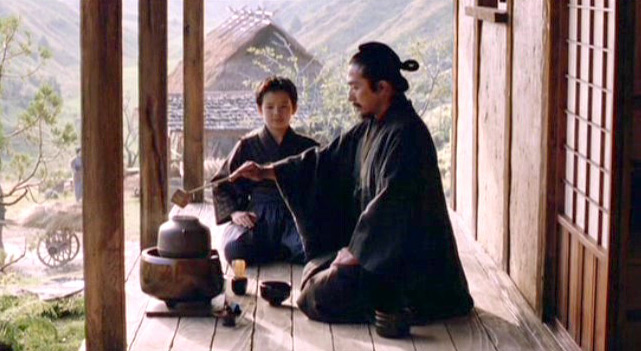Today I want to talk about risk. Taking an action that strips away the security net that we surround ourselves with. Knowingly or not, we all take steps to protect our financial well-being, our emotional well-being, our sense of self, and/or our place in this world.
Rebooting Your Life
In 2010, I threw security out the window. At least, security as many traditionally define it: a stable job and income. In the midst of the biggest recession of my lifetime, I left my job of 10 years, and didn’t apply for another. I actually turned down at least four unsolicited job offers from people I really respect. (that felt bizarre, and I was deeply honored by their interest.) That same year, my wife and I had our first child, a little boy. This year, my wife quit her job as an art teacher. She gave up amazing health benefits that were essentially free, as well as tenure at a job she enjoyed. I started a company, serving publishers and writers.
And yet, after having taking each of these steps that seemingly expose me to financial ruin, I have never been happier, felt more successful, or confronted with so much opportunity.
I enjoyed my corporate job – I liked what I did, the people I worked with, and the opportunities it provided. But deep down, I was often worried. There were always rumors about potential layoffs, reorganizations, and shifts in the corporate structure that would result in me losing my job. This was by no means unique to the company I worked for, friends at other companies expressed the same common themes that ran through their corporate life. By one colleague’s count, I had “survived” more than 20 rounds of layoffs over the years.
But now, without a “stable” job, with my wife not working, with another ‘mouth to feed,’ I have never slept better. I have never felt more helpful to others, more confident in my career. And I have never been presented with so many amazing opportunities.
Choosing a Path
It is interesting to consider career paths. In the corporate world, it would have been a slow movement up the corporate ladder. From Director to Senior Director to Junior Vice President to Vice President to Senior Vice President to President. On the surface, that embodies everything about the American Dream: opportunity.
Except…
So many executives I met at various companies over the years seemed unhappy in some ways. Yes, they appreciated their roles and the power and financial security that came with it. But their jobs had long since morphed from their true passion. The hours were brutal. They traveled often, spending great deals of time away from their families. The older they got, the more locked in they became. I could always sense the great unspoken fear of corporate America: “getting laid off at age 53.”
You can fill in any age to that phrase – but it implies that you are old enough to have achieved a nice salary, resume, and the wisdom of experience. But that if you are laid off at age 53 (or maybe it is 63 – I don’t really know), and have to find a similar job, you run the risk of being “overqualified” with a salary requirement that is beyond the range of what other companies want to pay.
The result of this scenario can be an aversion to risk: making decisions in your career that are survivalistic and protective, not expansive and innovative. It’s hard to take the risks to follow your true passion when you are too locked in to a certain path. When that path is surrounded by scary monsters, encouraging you to not take half a step off of it, lest your foot gets bitten off.
The Great Second Act
Steve Jobs’ career validates the dreams of so many mid-career managers. That they may feel they have hit a slump in their 30s or 40s, but that there can be a great second act where their best and most innovative work is still ahead of them. Frank Lloyd Wright’s career had an equally brilliant second act, as have some bands such as U2. Yes, it can be done.
But it’s hard. It’s risky. In the Steve Jobs bio, the ability to have a great second act was that “lasting companies know how to reinvent themselves… You’ve got to be like a butterfly and have a metamorphosis.” That is harder than it sounds.
Bono described reinventing U2 in 1990 as the following:
“You have to reject one expression of the band first, before you get to the next expression. And in between you have nothing. You have to risk it all.”
That middle phrase is the part that is often overlooked: “In between, you have nothing.”
I firmly believe that people get wiser and filled with more potential as they get older. Which is why I end up working with so many people who are trying to grow their impact and legacy through writing and publishing. It is incredibly inspiring to me.
The Myth of Being Your Own Boss
Being an entrepreneur means you are always standing on the precipice of success and failure. The most subtle change in the wind can dramatically shift your footing. Every decision is yours, and every resource you expend in both time and money comes from your own pocket. There is rarely a clear path. You have to analyze as best you can, then go on gut instinct. Risk is inherent in nearly everything you do.
Instead of one boss, the entrepreneur has many bosses. Every client or customer or student is a different boss. A relationship that has to be appreciated and respected.
And I love that. For my experience as an entrepreneur, it challenges me to become better at providing value to others, and to understand how I can do more to grow my impact and legacy.
But I often hear of people describing this as “being your own boss,” implying that you are no longer beholden to others. I feel like the opposite is true though, that I rely much more on others. And that it is truly a wonderful thing. In our culture, I think we need to become MORE connected to each other, not less.
Exponential Return on Investment
Yes, there is and will continue to be, great risk in what I am doing. Every year will be different as my business grows, waxes, wanes. I will experience what Seth Godin calls “The Dip.” There will be great challenges, often at unexpected time.
But, in this process, I am building skills. I am building wonderful connections with incredible people. I am pushing myself hard to provide as much value to others as I can.
Yes, a “regular” job has greater safety, and some really nice benefits. I would never begrudge anyone that. It is a deeply personal choice. But in that safety is often a diminished sense of opportunity, that there is a positive return on investment, but perhaps not an exponential return on investment. What you work on, who you work with, the outcomes of that work, such as salary, will likely grow slowly over the years. With risk of entrepreneurship does come the potential for unexpected and huge positive outcomes.
You Will Die. Build Your Legacy Today
Sorry to be so blunt, but it’s true. Regardless of what you feel happens once we pass on from this world, now is your time to build a legacy in this specific time and place. Only you can determine what that legacy will be. Some of the most amazing legacies are not defined by entrepreneurship at all: being a wonderful mother, a loyal employee, a giving member of the community. I love those.
Sometimes we are so fearful of the bad things that can happen if we take a risk, that we forget there could be positive outcomes. So we put off important goals time and time again. We live for the obligations of the present, and fear for the future. But…
If there is a creative dream in the back of your mind, but life’s pressures keep you from pursuing it, consider doing them in 2012. Give your dreams a chance, instead of constantly fighting to keep them down. I can’t guarantee safety, no one can. But if your goal is to have an impact on the world in a way you have not yet realized; if you hope to be remembered for things you have not yet done, then now is the time to start down that path.
Thanks.
-Dan




